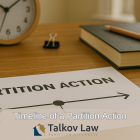Resolve Your Property Dispute Without Paying First
When co-owners in Hayward cannot agree on what to do with their shared property, the law provides a clear solution: partition. At Talkov Law, we specialize in partition actions in California, leveraging our extensive experience in real estate law and local property regulations to protect your rights and unlock your equity.
- Zero Partitions Denied
- 470+ Partition Cases Filed
- Most Cases Resolved in Under 7 Months
- No Fees Unless You Win!
Call Now at (510) 999-3300

Take Action to Resolve Your Partition Dispute
Our skilled partition attorneys will support you through every step. Let us handle the complex legal details while you move forward.
Co-Ownership Conflict? Not Anymore.
Most co-ownership disputes are settled in under 7 months, and you pay no upfront costs.
Talkov Law Partition Attorneys have handled hundreds of cases like yours as California’s only firm specializing entirely in partition actions.
Claim Your Free Consultation Now
Get clarity on your rights as a co-owner by booking your no-cost consultation now.

Start Your Legal Action

Get Your Share of the Equity
What is a Partition Action?
A partition action is a judicial process that ensures co-owned property is divided or sold when co-owners cannot agree.
Common Scenarios
- Dividing property after a breakup
- Family property held in joint names with no agreement to sell
- Co-owners where one wants to live in the property and the other wants to sell
In California, any co-owner has an absolute right to partition real property under California Code of Civil Procedure 872.710.

Trusted by Hundreds of Partition Clients
From complex legal battles to life-changing victories, our clients share how Talkov Law helped them find clarity, confidence, and success.
Frequently Asked Questions About Hayward Partition Actions
If you’re wondering whether you can force a sale, how expensive it might be, or how long the process could take, this FAQ has answers. If your question isn’t listed, your free consultation is just a click away.
📞 Call (877) PARTITION 📞
How long does a Partition Action take in Hayward?
Partition actions in Hayward handled by Talkov Law are often resolved in about 7 months, sometimes faster when co-owners are willing to negotiate a buyout or sale. Complex co-ownership situations, such as shared businesses or unrelated financial ties, can extend this timeline.
Can I recover attorney's fees in Hayward?
In a California Partition Action, including in Hayward, attorney's fees can be recovered if the court finds it equitable to do so, typically by apportioning the fees among the parties in proportion to their interests in the property.
Can one co-owner buy out the other in a Partition Action in Hayward?
Yes, in Hayward, co-owners involved in a Partition Action can agree to a buyout where one co-owner purchases the other's share, thereby avoiding the sale of the property and resolving the dispute amicably.
How is the property divided in a Partition Action in Hayward?
In Hayward, California, a court in a Partition Action may order the property to be physically divided among the co-owners if feasible, or more commonly, it may order the property to be sold and the proceeds distributed among the co-owners according to their ownership interests.

Hayward Real Estate and Legal Data
- In Hayward, the median home value is around $850,000.
- Hayward has an estimated population of 159,203.
- The average rent in Hayward is around $2,500 per month, as of 2024..
At Talkov Law, our Hayward Lawyers have resolved partition disputes in under 7 months with our expert partition strategies.
Why Choose Talkov Law for Your Partition Case?
- Trusted Experience: 470+ Partition Actions handled – More than any competitor
- Sole Focus: The only California attorneys practicing exclusively partition law
- Success Proven: Sixteen years strong with no denials


Partition Attorneys Serving All of Alameda County
Our attorneys have extensive experience handling partition actions across Alameda County.
Local Expertise in Neighborhoods Like: Castro Valley, San Lorenzo, and Union City. Also Serving Areas in:
San Ramon, Fremont, Pleasanton, Oakland, and Redwood City.
Your case will likely be heard at the Alameda County Superior Court, located at 1225 Fallon Street, Oakland, CA 94612.

































































































































